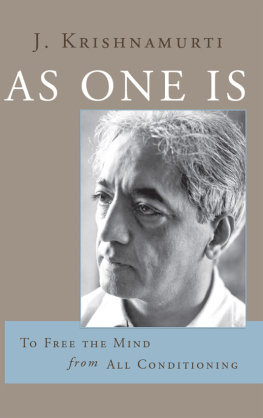Krishnamurti - A Flame of Learning: Krishnamurti with Teachers
Here you can read online Krishnamurti - A Flame of Learning: Krishnamurti with Teachers full text of the book (entire story) in english for free. Download pdf and epub, get meaning, cover and reviews about this ebook. publisher: Mirananda, genre: Religion. Description of the work, (preface) as well as reviews are available. Best literature library LitArk.com created for fans of good reading and offers a wide selection of genres:
Romance novel
Science fiction
Adventure
Detective
Science
History
Home and family
Prose
Art
Politics
Computer
Non-fiction
Religion
Business
Children
Humor
Choose a favorite category and find really read worthwhile books. Enjoy immersion in the world of imagination, feel the emotions of the characters or learn something new for yourself, make an fascinating discovery.

- Book:A Flame of Learning: Krishnamurti with Teachers
- Author:
- Publisher:Mirananda
- Genre:
- Rating:4 / 5
- Favourites:Add to favourites
- Your mark:
- 80
- 1
- 2
- 3
- 4
- 5
A Flame of Learning: Krishnamurti with Teachers: summary, description and annotation
We offer to read an annotation, description, summary or preface (depends on what the author of the book "A Flame of Learning: Krishnamurti with Teachers" wrote himself). If you haven't found the necessary information about the book — write in the comments, we will try to find it.
A Flame of Learning: Krishnamurti with Teachers — read online for free the complete book (whole text) full work
Below is the text of the book, divided by pages. System saving the place of the last page read, allows you to conveniently read the book "A Flame of Learning: Krishnamurti with Teachers" online for free, without having to search again every time where you left off. Put a bookmark, and you can go to the page where you finished reading at any time.
Font size:
Interval:
Bookmark:
A Flame of Learning: Krishnamurti with Teachers
Copyright 1993 Krishnamurti Foundation Trust Limited
A FLAME OF LEARNING
KRISHNAMURTI
with teachers
TABLE OF CONTENTS
Is it possible to transmit Krishnamurtis teachings to students through their subjects? The meaning of freedom and authority. Meeting a new teacher. Right relationship with students. Having no motive and no self-interest.
Order without authority. Repetition and learning. The habit-forming mechanism. Watchfulness. Creating a flame of learning together.
Will a student be transformed when he leaves? Realizing that I am the world. Going to the root of something and being free of it. Learning together. Fear and violence. Observing without distortion. Awakening intelligence and order.
Perception and instant action. Can thought change itself? Jealousy. Insecurity. Speaking with the student. Seeing psychological dangers.
Clarity of observation. Attachment. Looking at myself. Pleasure. Investigating deeply. Being in communication. Fear. The mechanical process of word/thought/image. Investigating into myself.
Is it possible to see a habit and drop it? Radical psychological change. A passionate concern. Action, not ideas. Love.
CHAPTER ONE
Krishnamurti: I dont quite know how to begin this. There are several schools in India, one here and one in Ojai, California. The intention of these schools is to impart these teachings [Krishnamurtis teachings], which some of you have heard or read, to the students through their academic subjects. We have in all these places a group of teachers who are sufficiently interested in the whole operation of these schools to do this.
We have been trying for many years to have all these schools act as one unit, though they are legally, nationally, separate. Were trying to bring about a feeling which doesnt exist anywhere else in the world, that were all working together for the same thing. Were going to see if it is possible to find out how to transmit or translate these teachings to the students through their subjects.
What do you say? If we could have the same kind of teaching, the same kind of education throughout these schools, here, in India, in California, it would be a marvellous thing. Am I conveying anything at all?
Teacher: You mean, something more than the same intention?
K: Yes. To teach the ordinary subjects is essential for various reasons which we dont have to go into, but can we, through the subjects which every student has to go through, convey these teachings to them? Say Im a teacher of history in one of these schools. I would like when Im teaching history to convey the teachings to the students.
T: I think even among the teachers here, theres no agreement on what the teachings are, really. I shouldnt say no agreement; Id say there is some disagreement as to what the teachings are and, of course, they are filtered through the personal image of each one of us.
K: Look, can we do this here? If we all think these teachings are important, how shall we transmit them to the student so that we have a different kind of human being leaving these schools who is not just like everybody else? Im not being snobbish or trying to be super-elite, but I think thats the intention of all these schools.
Now, how shall we do it? As teachers here, as staff, how shall we work together to bring this about?
T: If we are all clear what the teachings are, its bound to come about without any plan. What youve got inside you comes out in your approach to the subjects.
K: But Mr. J. says its not very clear what were talking about, what these teachings are.
T: Its clear, but theres not a consensus about it. One may feel that one is very clear oneself.
K: All right, sir, let us take, for example, one thing, freedom. Whats the meaning of that word, the nature of it? How shall we transmit to the student what the implications of that word are: responsibility, no authority, a sense of a capacity to investigate into oneself and therefore to investigate the world, and so on, impersonally, all that we have been talking about, more or less? Taking that first thing, freedom, how shall we convey this to the student in the subjects that we are teaching?
T: People have their areas of responsibility, physics, chemistry, kitchen, office, garden and, for the most part, I dont really know what someone does in mechanical drawing or in maths.
K: Cant we talk together about it?
T: But we dont actually do that. I mean, we never have done it, so it is not clear to all of us what another teacher or person is doing.
K: Now, cant we together see what each one of us is doing, how each one of us transmits this to the student, and interchange, see if we cant improve it?
T: Sir, this would have to happen not just in the classroom, but outside the classroom too.
K: Throughout the day. How will you do this? As Mr. J. points out, each of us may do it in his own way, but were not telling each other what we do and so helping each other and correcting each other, so that we are all working together. Is that possible?
T: There seems to be one problem. If one truly has an understanding about freedom that is not intellectual, not verbal, then there is no problem, ones actions will be correct; but if its just verbal it is not enough.
K: No, it doesnt go deeply enough. How shall we do this? Suppose I teach history. I may be interpreting the teachings in my own way and expressing that through my teaching of history. But if I discuss it with you all, you might correct me, say, Youre doing it wrong, old boy; change it. And we would correct each other, and therefore be building this thing together.
T: Krishnaji, do you mean doing this specifically with regard to the subject, or in our everyday relationships?
K: Both, both.
T: We have discussed our everyday relationships exhaustively, but it seems to me that there is an unknown area, which is living them in the classroom when you have to teach physics or geography.
K: Thats what Im trying to get at.
T: Weve discussed what we do in relationship. Not that we understand the total effect, perhaps, but could we be more specific in this? Because, not only the people in this room, but those other teachers and would-be teachers all over the world, are asking you these questions, in letters, constantly.
K: I know. Thats why Im asking how we shall do this together. Now what shall we do? Come on, lets help each other in this.
T: We could attend each others classes.
K: I dont know, lets find out.
T: We can meet and discuss what we are actually doing in our classes and learn from each other.
K: Can we do that?
T: We do that now.
K: Thats what I want to do now. Can we do that now?
T: Are we saying that what we would like to accomplish in the classroom is to have the student use his brain in a different capacity from the way hes used to, so that he has a feeling for what it means to think creatively, not just receive knowledge? Is that what you are hinting at, that in the actual day to day teaching of maths, biology, and so on, our approach in these schools will be such that the students brain is exposed to a different way of operation?
K: You might do it in a most proficient way, and I mightnt. And by talking it over with all of us together, as were doing now, you might help me to accelerate my own learning.
T: I dont want just to accelerate how efficiently I pass on knowledge.
T: Without worrying about the proficiency of our teaching, right now we could individually say what we have been doing in our classes.
Next pageFont size:
Interval:
Bookmark:
Similar books «A Flame of Learning: Krishnamurti with Teachers»
Look at similar books to A Flame of Learning: Krishnamurti with Teachers. We have selected literature similar in name and meaning in the hope of providing readers with more options to find new, interesting, not yet read works.
Discussion, reviews of the book A Flame of Learning: Krishnamurti with Teachers and just readers' own opinions. Leave your comments, write what you think about the work, its meaning or the main characters. Specify what exactly you liked and what you didn't like, and why you think so.







